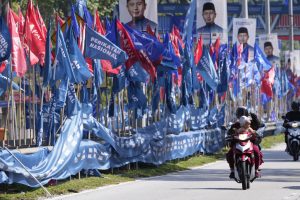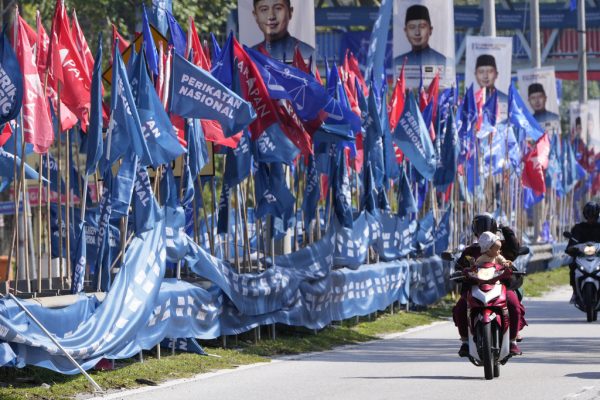
Motorcyclists pass by campaign flags ahead of the state election in Gombak, on the outskirts of Kuala Lumpur, Malaysia, Aug. 9, 2023.
Credit: AP Photo/Vincent Thian
Just nine months after the formation of the federal government in November 2022, Malaysia’s political parties are deep in another round of heated electoral battle in six states: Kedah, Kelantan, Negeri Sembilan, Penang, Selangor, and Terengganu. Tomorrow, some 9.7 million Malaysian voters will cast their votes and decide the fate of 570 candidates from nine parties, who are competing for a total of 245 state assembly seats across the six states.
These states present almost the full political spectrum of Malaysian politics, with advanced metropolitan states like Selangor and Penang voting alongside rural hinterland states such as Kedah, Kelantan, and Terengganu. Kedah and Kelantan are among the country’s five poorest states, while Selangor and Penang are among the five most prosperous, alongside Kuala Lumpur and Putrajaya.
The upcoming state elections are considered by many as a litmus test for Prime Minister Anwar Ibrahim’s unity government. The state polls will mainly pit Anwar’s Pakatan Harapan (PH) coalition and its unity government ally, Barisan Nasional (BN), against the federal opposition alliance Perikatan Nasional (PN). The contending coalitions each currently hold three of the six states and will try to hold onto their states while advancing into the other’s strongholds. The PH-BN alliance is counting on their supporters to back these two parties – once bitter rivals – against their common foe: PN.
As far as the ruling coalition is concerned, the state elections will not significantly affect the current position of the prime minister and the ruling parties, since the Anwar government already has a two-thirds majority in the 222-seat federal Parliament. They might, however, serve as an indirect gauge of voter perceptions of the ruling coalition and have an unforeseen effect on how successfully the parties in the coalition cooperate in the coming years at the state and federal levels. A result that goes against the ruling coalition would initiate a period of tension between the federal government controlled by PH-BN, and the state governments controlled by PN.
Diplomat Brief
Weekly Newsletter
Get briefed on the story of the week, and developing stories to watch across the Asia-Pacific.
Get the Newsletter
Frictions between the ruling federal PH-BN government and new state governments led by the opposition over political promises and economic policies will also emerge if the PH-BN coalition is unable to hold onto power. For instance, in the case of Penang, there is controversy surrounding the Penang South Island (PSI) project, which aims to reclaim land off the coast that it plans to transform into a smart city and world-class trade and tourist destination. While the PH state government approved the project, the United Malays National Organization, the primary component of BN, has been critical of the PSI in the past and pledged to scrap it, largely due to the impact that it is set to have on Malay fishing communities along Penang’s coast.
With Dominic Lau, the president of Gerakan, a member of the PN opposition, promising that the PSI project will be scrapped if PN forms the next state government, the PH-BN coalition has been placed in a difficult situation. In particular, BN has opened itself up to criticisms that it has abandoned Malay fisherfolk by allying itself with PH.
While it seems unlikely that Anwar’s coalition will capture a majority of the states, recent polls by the Merdeka Center indicate that the unity government is not facing a major challenge. According to the survey carried out in the second month following the GE15, over two-thirds of Malaysian voters gave Anwar Ibrahim positive ratings. Tomorrow’s elections will of course reflect the PH-BN coalition’s credibility at the national level, but then such perceptions are subject to constant change whatever the election result.
A good example are the economic initiatives undertaken by Anwar under his Malaysia Madani slogan, which Anwar claims will bring Malaysians more employment opportunities, a social safety net, and fair access to economic opportunities. In his address at the 36th Asia Pacific Roundtable, Anwar claimed that the “Madani Economy” aims to boost the country’s economy and “empower the people by addressing the various challenges and issues related to competitiveness in the global arena.” The primary strategic thrust is to restructure the economy with the goal of making Malaysia a leading Asian economy and transforming it into an equitable, accountable, and sustainable nation. Any state or federal government that can provide these things will enjoy strong popular support.
Advertisement
At the same time, Anwar’s unity government is facing resistance from the country’s ethnic Malay majority, whose votes swung in large numbers toward PN at last year’s general election (GE15), in large part due to the use of racial and religious appeals by the PN camp, which has depicted itself as the guardian of Malays and Islam. This was encapsulated by the rise of the Islamic party PAS, which was the best performing single party in GE15 and is now the dominant component of PN. Should PAS continue to gain support at this weekend’s state elections, it could lead to the further Islamization of the country, further political polarization along racial and religious lines, and a long-term challenge for Anwar’s multi-ethnic unity government.
An emerging pillar worth the attention of political analysts is the Malaysian United Democratic Alliance (MUDA), led by Syed Saddiq. Saddiq represents the new multicultural outward-looking liberal youth of Malaysia, who are concerned about the ills and evils in Malaysian political system. How MUDA fares in the state elections will bear close watching.
The immediate point worth pondering, however, is whether the state elections potentially lead to changes in the leadership or composition of the unity government and how this might impact its stability. The answer lies somewhere between a straight yes and no. Overall, the state elections will be seen as a reflection of the acceptability of the PH-BN coalition, and of the Anwar government in general. That said, the government is unlikely to be affected – at least in the short term – by an adverse result.
